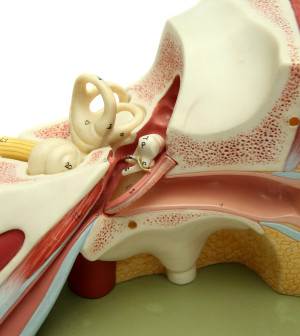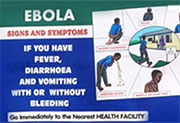- Could Your Grocery Store Meat Be Causing Recurring UTIs?
- Are You Making This Expensive Thermostat Error This Winter?
- Recognizing the Signs of Hypothyroidism
- 10 Strategies to Overcome Insomnia
- Could Artificial Sweeteners Be Aging the Brain Faster?
- Techniques for Soothing Your Nervous System
- Does the Water in Your House Smell Funny? Here’s Why
- Can a Daily Dose of Apple Cider Vinegar Actually Aid Weight Loss?
- 6 Health Beverages That Can Actually Spike Your Blood Sugar
- Treatment Options for Social Anxiety Disorder
WHO Urges Screening of Travelers to Contain Ebola Outbreak


African nations hit hard by the Ebola outbreak should start screening all passengers leaving international airports, seaports and major ground crossings, the World Health Organization recommended Monday.
The United Nations’ health agency reiterated that the risk of passengers transmitting the Ebola virus during air travel is low. Still, anyone with an illness or symptoms typical of the highly virulent disease shouldn’t be allowed to travel unless it’s for appropriate medical care, the agency said in a statement.
Symptoms of Ebola include a sudden fever, intense weakness, muscle pain, headache and sore throat. This is followed by vomiting, diarrhea, rash, poor kidney and liver function and, in some cases, both internal and external bleeding.
Unlike diseases such as tuberculosis or flu, Ebola isn’t spread by breathing air from an infected person. Transmission requires direct contact with blood, secretions, organs or other body fluids of infected living or dead persons or animals, the agency said.
“Travelers are, in any event, advised to avoid all such contacts and routinely practice careful hygiene, like hand washing,” the agency said.
The latest WHO figures put the death toll from the outbreak at nearly 1,070, with approximately 2,000 confirmed cases. At this point, Ebola cases have been reported in Guinea, Liberia, Sierra Leone and, to a lesser extent, Nigeria.
But, the magnitude of the Ebola outbreak in West Africa may be far greater than current statistics indicate, WHO officials reported Friday.
Patients were flooding treatment centers that have just opened, and the recorded case and death tolls may “vastly underestimate the magnitude of the outbreak,” said WHO spokesman Gregory Hartl, the Associated Press reported.
Ebola has a mortality rate approaching 90 percent, according to WHO officials.
The U.S. Centers for Disease Control and Prevention has been providing computer software and hardware to the countries hit hardest by Ebola, so officials there can track and analyze the outbreak’s spread in real time, WHO added.
Meanwhile, the husband of one of two U.S. aid workers infected with Ebola while in West Africa has been declared healthy following the completion of a 21-day quarantine. In a statement released Monday, David Writebol said he was reunited Sunday with his wife, Nancy Writebol, who continues to undergo intensive medical care at Emory University Hospital in Atlanta.
David Writebol was quarantined after his wife, a missionary, came down with Ebola while in Africa. He said he was released from supervision and enjoyed a through-the-looking-glass reunion Sunday with his wife in Atlanta, USA Today reported.
Nancy Writebol and fellow missionary Dr. Kent Brantly were transferred to Emory for treatment after they had become infected with Ebola.
David Writebol said the reunion with his wife took place through the window of her medical isolation unit, USA Today reported.
“I have had the great joy to be able to look through the isolation room glass and see my beautiful wife again,” he said in a statement. “We both placed our hands on opposite sides of the glass, moved with tears to look at each other again. She was standing with her radiant smile, happy beyond words. She is continuing to slowly gain strength, eager for the day when the barriers separating us are set aside, and we can simply hold each other.”
Both Writebol and Brantly face a long, challenging road to full recovery, but shouldn’t endure long-term illness or disability because of their brush with the deadly pathogen, according to one of the United States’ most experienced Ebola experts.
Both patients likely will spend weeks, if not months, regaining their strength and body weight following the ravages of Ebola, Dr. Joseph McCormick, regional dean of the University of Texas School of Public Health in Brownsville, told HealthDay.
But they most likely haven’t suffered any permanent organ damage or contracted a lasting chronic illness from the virus, McCormick said, and ought to emerge from their struggle with immune resistance against future Ebola infection.
He said most survivors “get pretty much back to normal” over time, but admitted “this is something we know less about than we should.”
McCormick is one of the very few U.S. physicians with first-hand experience with Ebola. As an officer with the U.S. Centers for Disease Control and Prevention, he belonged to the team that investigated the first Ebola epidemic in 1976, which occurred in the Congo, as well as the next two African outbreaks of Ebola.
More information
Visit the U.S. Centers for Disease Control and Prevention for more on the Ebola outbreak.
Source: HealthDay
Copyright © 2026 HealthDay. All rights reserved.










